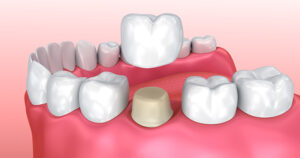What Causes TMJ Disorder? (Symptoms to Look For)

If you’ve heard of or been diagnosed with a temporomandibular joint (TMJ) disorder, you may be wondering, “What causes TMJ disorder?”
The short answer?
Your jaw is inflamed or misaligned.
But wait, there’s more!
See how stress and other factors affect your well-being and cause TMJ symptoms to flare up.
What causes TMJ disorder?
TMJ disorder (TMD) happens when your jaw isn’t in its optimal position.
This is typically caused by:
- Trauma to the mouth and surrounding areas
- Jaw muscle fatigue
- Teeth grinding (bruxism)
- Bone cartilage damage around the joint
- Arthritis
- Genetics
- Poor dental work
Stress is one of the most significant factors of TMJ flare-ups.
Not only does stress take a toll on your state of mind, but it affects your physical well-being too.
How?
Well, stress leads to clenching your jaw, grinding your teeth at night, and hormonal changes – all of which you can’t control sometimes!
And in turn, this causes TMJ disorders.
The excessive strain on your jaw joints affects your chewing, swallowing, and speech.
What are the symptoms of TMJ disorder?
If you’ve experienced unexplainable headaches or facial soreness, you may be going through TMJ disorder.
Other symptoms to look out for include:
- Ringing in the ears
- Vertigo or dizziness
- Limited jaw movement; stiff jaw, neck, or shoulders
- Clicking or popping in your jaw joint
When left untreated, it can lead to:
- Persistent headaches
- Chronic jaw pain
- Tooth loss
- Digestive issue
- Heart problems
It’s essential to treat the root causes of TMJ disorder rather than just relieving symptoms.
Can I treat TMJ disorder at home?
You can alleviate pain from TMJ disorders at home but should see a trained medical professional to treat the root cause of your TMJ.
Some things that may help include:
- Avoid hard or sticky food: These types of food can aggravate your symptoms.
- Learn stress management: Yoga poses, deep breathing, and meditation are great for controlling stress.
- Use heat or cold compresses: These can help numb or relax your sore jaw and facial muscles.
Again, these home remedies can relieve TMJ symptoms, but speaking to a specialist gives you the option to eliminate pain altogether.
What will happen if TMJ is not treated?
If your TMJ disorder isn’t treated, your day-to-day life will be affected adversely by persistent pain and aches.
It’s not life-threatening, though.
But:
Untreated TMJ disorder leads to other diseases such as anxiety and depression and the inability to lead a productive life.
The constant headaches, facial or jaw tension, and other symptoms take a toll on your overall well-being.
It’s possible to eliminate the unbearable pain through TMJ therapy.
TMJ relief in Reston and Ashburn, VA
Our dentists at Virginia Dental Solutions will pinpoint the cause of your TMJ disorder. Every case is unique, so we’ll recommend a personalized treatment for you.
This may include jaw and facial relaxation exercises, lifestyle changes, restorative dental treatments, a mouthguard or nightguard, or possibly jaw surgery.
Take control of your life and eliminate your TMJ pain by scheduling a consultation with us today.
Or reach us by:
- Calling us in Reston at 703-437-8811
- Calling us in Ashburn at 703-858-0000
- Emailing us directly at [email protected]
Our offices are located in Reston… opens in a new window to Google Maps… and Ashburn, VA… opens in a new window to Google Maps…, serving surrounding communities of Herndon, Great Falls, Vienna, Chantilly, Fairfax, Falls Church, Annandale, Burke, Brambleton, Landsdowne, Leesburg, Purcellville, Hamilton, Round Hill, Aldie, Centreville, McLean, Broadlands, and Sterling.


